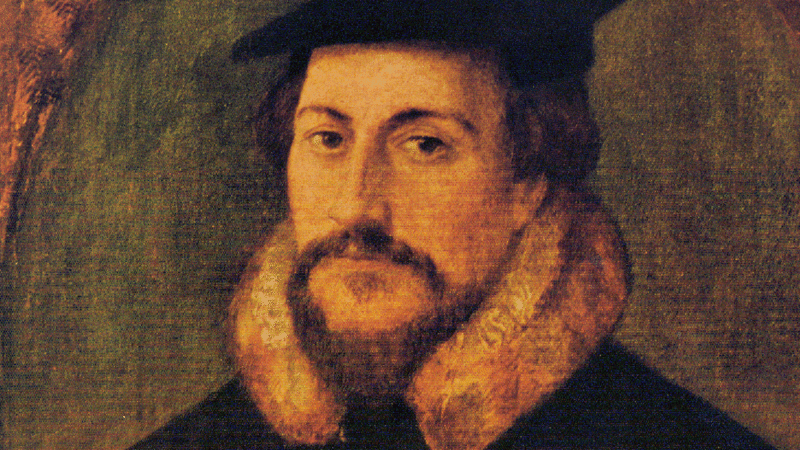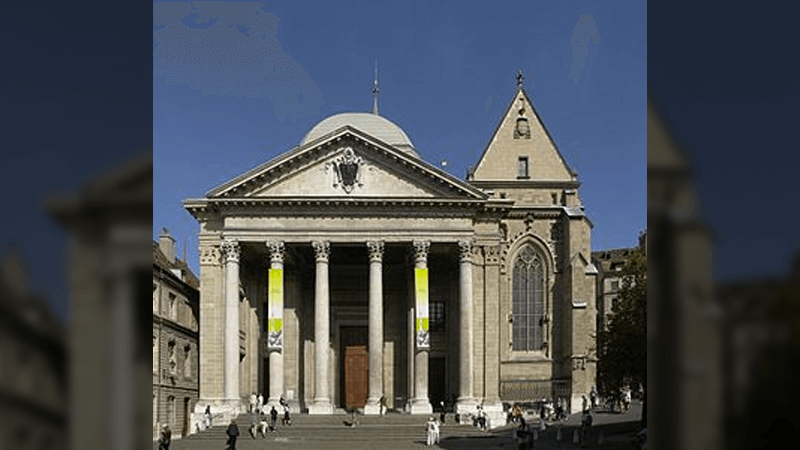III – God’s Glory

In the third part of our Reformation series, Dr Sharon James considers John Calvin.
The Reformation was a time of powerful spiritual revival.
Biblical truth was rediscovered. Countless people across Europe experienced the reality of peace with God.
Among them was John Calvin.
He was born in 1509 in Noyon, in Northern France. Brought up in a conventionally Roman Catholic household, John was sent as a teenager to study in Paris. He took degrees in theology and, later in law.
By this time, many in France were discovering the wonderful reality of God’s saving grace as they read the Bible in their own language.
In 1512, French scholar, Jacques Lefevre (1455–1536), discovered from study of Scripture, the truth of justification. Some of his students, including William Farel, were powerfully converted. By 1524 the complete New Testament was published in French.
During subsequent decades, many in France came to saving faith. Including Calvin. But, the authorities ruled that reformed believers were to be burned to death. Calvin had to flee: first to Strasbourg, then to Basel.
Calvin’s Institutes
While in exile, Calvin published the first edition of his famous Institutes: a simple handbook of the Reformed faith for new believers. He continued working on the Institutes until his death. Six chapters expanded to eighty, filling four volumes.
• Book I explores the Glory of God the Creator. The whole cosmos is a dazzling theatre in which God’s glory is displayed. God has crammed this world with good to bless all people. This is sometimes referred to as ‘common grace’.
• Book II deals with the Glory of Christ the Redeemer. Christ our Mediator provides us with all we need for salvation. He is our prophet, our priest, and our King.
• Book III explains the Glory of the work of the Spirit and salvation. Salvation is grounded in God’s sovereign choice of some people to be saved. God alone is glorified in salvation. We can take no credit.
After Calvin’s death, some of his followers organised this teaching in the form of the so-called ‘Five Points’ of Calvinism (commonly summarized in an acrostic: TULIP):
Total Depravity: Every aspect of our being, our mind, affections and will, are corrupted by sin, and have a bent towards worshipping things other than our Creator.
Unconditional Election: We are dead in sin (Ephesians 2:1), and it is God who saves us, not on the basis of anything we have done to win his favour (Ephesians 1:8-10).
Limited Atonement: Christ gave himself up for the Church (Ephesians 5:25). While the offer of the Gospel is to be extended to all, Christ’s death actually saves his own people (John 6:37).
Irresistible Grace: God’s work of salvation involves raising the dead to life. His grace is ‘effectual’ in the salvation of his people.
Perseverance of the Saints: God’s saving power is also his keeping power. He does not rescue, and then cast off.
• Book IV dealt with The Glory of God in the Church and in the World, explaining the Church, the sacraments, and Civil Government.
The heart desire throughout the Institutes is everyone should glorify God by a life of adoring worship for the wonder of his work in creation, redemption and history.
And the certain hope expressed throughout this great work is that God’s purposes in this world for his glory will be completed.
Calvin expelled
In 1536, Calvin, aged twenty-seven, had just published the first edition of the Institutes. That same year, when travelling through Geneva, he was recruited by a fellow Frenchman, William Farel, to help reform that city.
Calvin prepared a Reformed Confession of faith, and the City Council agreed that any citizens who refused to accept the Confession should be banished. But the Council could not carry the populace with them, and Calvin and Farel were expelled instead.
For three years, Calvin pastored a French refugee congregation in Strasbourg. In 1541 he was invited to return to Geneva after some of his friends gained control of the Council. He remained there until his death in 1564, preaching Sunday by Sunday at St Peter’s Cathedral.
As a ‘magisterial’ reformer, Calvin expected that all citizens of Geneva should present their children for baptism, and all citizens were to outwardly conform to reformed orthodoxy.
Heresy was to be punished, which, famously, led to the burning of Michael Servetus in 1553. This man denied the Trinity. He was not a citizen of Geneva, but while visiting the city was arrested. Calvin was active in his arrest and imprisonment, and endorsed the death sentence, although he would have preferred execution to burning.
Dark side
The dark side of the magisterial reformers’ belief in the territorial church was the willingness to use coercion in religion, and the refusal to allow freedom of conscience.
Ironically, Geneva itself was a haven of refuge to Protestants fleeing persecution. Many of them then returned, after rigorous Bible training, as missionaries to their native lands, especially France. By 1562, there were around two million members of reformed churches in France (by this time the name given to them was ‘Huguenots’, a name that probably originated in Geneva).
Calvin was only fifty-four when he died. We should not idolise him: he was a child of his time, still operating within the medieval mindset of enforcing religious conformity.
But we can be thankful to God for the clarity and power with which he pointed to the supremacy of God’s glory in all things.
Great and Marvellous are your deeds, Lord God Almighty.
Just and True are your ways, King of the Ages.
Who will not fear you, O Lord, and bring glory to your name?
For you alone are holy.
All nations will come and worship before you, for your righteous acts have been revealed.
This is an abridged version of a talk given by Dr Sharon James at Word Alive 2017, the full transcript including footnotes is available here: www.reformation-today.org/articles-of-interest/the-reformation-rediscovering-the-power-of-the-gospel-a-series-of-papers-by-dr-sharon-james-presented-at-the-word-alive-conference-2017-part-iii
Read The Reformation: I God’s Word: ‘Sola Scriptura’ and II God’s Grace.


